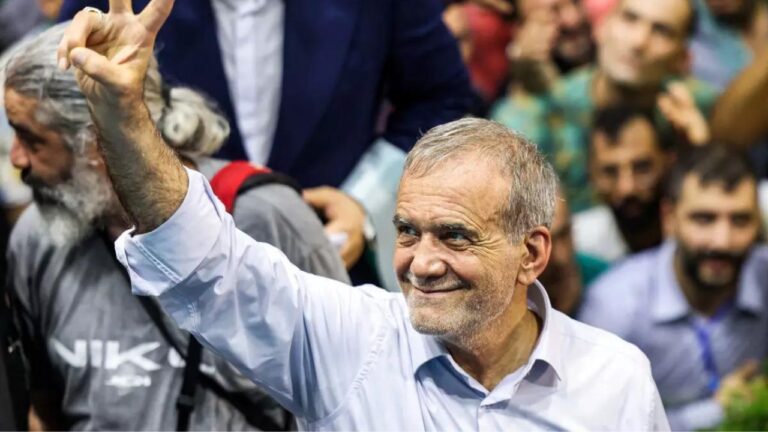Reformist candidate Massoud Pezeshkian, a heart surgeon, has won the Iranian presidential runoff election. His campaign pledges included cooperation with the West and easing enforcement of Iran’s compulsory headscarf law. Pezeshkian’s hardline rival, Saeed Jalili, lost the election.
According to Iran’s election authorities, some 30 million people voted in the election, with Pezeshkian receiving more than 17 million votes and Jalili receiving more than 13 million.
Who is Masoud Pezeshkian?
Born on September 29, 1954 in Mahabad, Iran, Pezeshkian’s diverse ethnic background gave him an understanding of Iran’s cultural fabric, and after serving in the Iran-Iraq War he went on to a career as a renowned cardiac surgeon and later led the Tabriz University of Medical Sciences.
Pezeshkian’s life took a tragic turn in 1994 when his wife, Fatemeh Majidi, and one of his daughters were killed in a car accident. This prompted him to enter politics, where he served as deputy minister and later minister of health under President Mohammed Khatami. Throughout his political career, Pezeshkian has sought to balance reformist ideals with the constraints of Iran’s theocratic system.
About Iran’s controversial hijab law
Following Mahsa Amini’s death in 2022, Pezeshkian publicly criticized the case, saying, “It is unacceptable in the Islamic Republic to arrest a girl simply because she was wearing a hijab and then hand over her body to her family.”
He pointed out the government’s shortcomings in a televised debate, saying: “We are losing support from society because of our actions, high prices, the treatment of girls and internet censorship. People are unhappy with our actions.”
Low voter turnout
The June 28, 2024 presidential election, in which Pezeshkian faced off against hardline former nuclear negotiator Saeed Jalili in a runoff election, saw the lowest voter turnout in Iran’s history. Supported by moderates and reformists, Pezeshkian’s campaign advocated improved ties with the West, a return to the nuclear deal, and a more tolerant approach to hijab law. Despite his efforts, voter turnout remains low, and many Iranians have expressed disillusionment with the ruling system.
Pezeshkian confirmed this sentiment during his final debate with Jalili, saying: “Despite all the loud arguments between me and him, only 40 percent (of voters) voted. 60 percent do not accept us. That’s why people have a problem with us.”
Throughout his election campaign, he refrained from promising radical change to Iran’s Shiite theocracy and has consistently acknowledged Supreme Leader Ayatollah Ali Khamenei as the highest authority in state affairs.
The elections followed the death of President Ebrahim Raisi in a helicopter crash in May. Raisi was widely seen as a leading ally of Khamenei and was considered a possible successor to the supreme leader’s position, but his legacy was tarnished by his involvement in mass executions carried out in Iran in 1988 and the violent crackdown on protests following the death of Ayatollah Mahsa Amini in 2022.
According to Iran’s election authorities, some 30 million people voted in the election, with Pezeshkian receiving more than 17 million votes and Jalili receiving more than 13 million.
Who is Masoud Pezeshkian?
Born on September 29, 1954 in Mahabad, Iran, Pezeshkian’s diverse ethnic background gave him an understanding of Iran’s cultural fabric, and after serving in the Iran-Iraq War he went on to a career as a renowned cardiac surgeon and later led the Tabriz University of Medical Sciences.
Pezeshkian’s life took a tragic turn in 1994 when his wife, Fatemeh Majidi, and one of his daughters were killed in a car accident. This prompted him to enter politics, where he served as deputy minister and later minister of health under President Mohammed Khatami. Throughout his political career, Pezeshkian has sought to balance reformist ideals with the constraints of Iran’s theocratic system.
About Iran’s controversial hijab law
Following Mahsa Amini’s death in 2022, Pezeshkian publicly criticized the case, saying, “It is unacceptable in the Islamic Republic to arrest a girl simply because she was wearing a hijab and then hand over her body to her family.”
He pointed out the government’s shortcomings in a televised debate, saying: “We are losing support from society because of our actions, high prices, the treatment of girls and internet censorship. People are unhappy with our actions.”
Low voter turnout
The June 28, 2024 presidential election, in which Pezeshkian faced off against hardline former nuclear negotiator Saeed Jalili in a runoff election, saw the lowest voter turnout in Iran’s history. Supported by moderates and reformists, Pezeshkian’s campaign advocated improved ties with the West, a return to the nuclear deal, and a more tolerant approach to hijab law. Despite his efforts, voter turnout remains low, and many Iranians have expressed disillusionment with the ruling system.
Pezeshkian confirmed this sentiment during his final debate with Jalili, saying: “Despite all the loud arguments between me and him, only 40 percent (of voters) voted. 60 percent do not accept us. That’s why people have a problem with us.”
Throughout his election campaign, he refrained from promising radical change to Iran’s Shiite theocracy and has consistently acknowledged Supreme Leader Ayatollah Ali Khamenei as the highest authority in state affairs.
The elections followed the death of President Ebrahim Raisi in a helicopter crash in May. Raisi was widely seen as a leading ally of Khamenei and was considered a possible successor to the supreme leader’s position, but his legacy was tarnished by his involvement in mass executions carried out in Iran in 1988 and the violent crackdown on protests following the death of Ayatollah Mahsa Amini in 2022.

